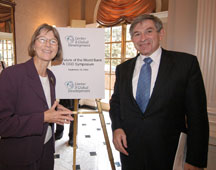How should the world's largest and most influential development institution address the challenges of the 21st Century? Ten distinguished speakers gathered on the eve of the World Bank/IMF 2005 Annual Meetings to offer fresh ideas concerning such topics as differentiated services for the poorest countries and the big middle-income and emerging market borrowers; global public goods; evaluation; and governance of the Bank itself. World Bank President Paul Wolfowitz spoke briefly with participants before the start of the meeting. He thanked CGD President Nancy Birdsall for the Center's report, The Hardest Job in the World: Five Crucial Tasks for the New President of the World Bank. "This is a valuable piece of work that has been done," he said. "I like the emphasis on results." Wolfowitz added that he would have liked to spend the day at the Symposium but since that was not possible he would have to settle for receiving an account of the discussions after the event.
Transcripts of the proceedings and speaker biographies are available below. *Papers based on the presentations will be published as a conference volume.

CGD President Nancy Birdsall and World Bank President Paul Wolfowitz kick off CGD's World Bank Symposium.
Event Proceedings
Opening remarks by Nancy Birdsall, Center for Global Development
Full text (PDF)
Role of the Bank in Low-Income Countries
Speakers
William Easterly, New York University
Steve Radelet, Center for Global Development
Description
While broad support exists for an expanded Bank role in low-income countries, serious concerns persist about the effectiveness of past efforts. In the future, how should the Bank adjust its role in these countries to address such issues as country governance, grant financing and working with the IMF to protect against external shocks?
Full text (PDF)
Who Watches the Watchdogs? The Role of the World Bank
Speakers
Pierre Jacquet, Agence Française de Développement
Ruth Levine, Center for Global Development
Description
Thorough and credible evaluation of development projects and programs is necessary to ensure transparency and effectiveness. How can the Bank lead efforts to improve the quality and influence of independent evaluation of its operations? On a related note, how can the Bank promote the latest thinking on impact evaluation amongst other development actors?
Full text (PDF)
Votes and Voice: Who Should Control the World Bank?
Speakers
Masood Ahmed, UK Department for International Development
John Taylor, Stanford University
Description
The Bank’s governance arrangements, by which voting rules favor contributing members over borrowing members, are an area of continued controversy. Do current voting shares and board representation require change in order to make the Bank more representative and legitimate? And by what process should the next President of the World Bank be chosen?
Full text (PDF)
Who Needs the World Bank: The Future of China, India and the Middle-Income Countries?
Speakers
Adam Lerrick, Carnegie Mellon University
David de Ferranti, Brooking Institution
Description
Borrowing by middle-income countries from the Bank has declined dramatically. This trend comes with serious implications, including risks to the Bank’s global expertise, its ability to leverage equitable and sustainable policies, and its net income over the long run. Should the Bank attempt to remain relevant for these countries; and if so, how should it respond now?
Full text (PDF)
The Missing Mandate: Global Public Goods
Speaker
Michael Kremer, Harvard University
Description
The Bank, like most development agencies, is structured to make loans to individual nations. But some of the key challenges in development, from the development of a malaria vaccine to the creation of an African road network, will require investments that no single nation may be prepared to take on its own. Can the bank play a role in these areas? If special procedures are to be put in place for global public goods, how should those goods be defined?
Full text (PDF)
Closing remarks by Nancy Birdsall, Center for Global Development
Full text (PDF)








